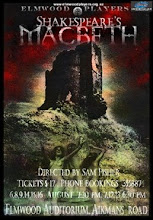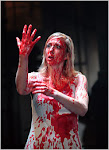This entry looks at my central confusion with the script and performances:
1. At least there's only one text! Unlike many of Shakespeare's surviving works there is only one version of Macbeth (first folio 1623). It is known the play was revised and there are many questions about whether there was a missing subplot or whether some parts, such as Hecate's scene, aren't original.
Wikipedia has a lot to say about the origins:
Many scholars conjecture the likely date of composition to be between 1603 and 1606.[2] As the play seems to be aimed at celebrating King James's ancestors and the Stuart accession to the throne in 1603 (James believed himself to be descended from Banquo),[3] they argue that the play is unlikely to have been composed earlier than 1603; and suggest that the parade of eight kings—which the witches show Macbeth in a vision in Act IV—is a compliment to King James VI of Scotland. Other editors conjecture a more specific date of 1605-6, the principal reasons being possible allusions to the Gunpowder Plot and its ensuing trials. The Porter's speech (Act II, scene III, lines1-21), in particular, may contain allusions to the trial of the Jesuit Henry Garnet in spring, 1606; "equivocator" (line 8) may refer to Garnet's defence of "equivocation" [see: Doctrine of mental reservation], and "farmer" (4) to one of Garnet's aliases.[4] However, "farmer" is a common word, and the concept of "equivocation" was also the subject of a 1583 tract by Queen Elizabeth's chief councillor Lord Burghley, and of the 1584 Doctrine of Equivocation by the Spanish prelate Martin Azpilcueta, which was disseminated across Europe and into England in the 1590s.[5]
Scholars also cite an entertainment seen by King James at Oxford in the summer of 1605 that featured three "sibyls" like the weird sisters; Kermode surmises that Shakespeare could have heard about this and alluded to it with the weird sisters. The earliest account of a performance of the play is April 1611, when Simon Forman recorded seeing it at the Globe Theatre.
Anyway the point of this is that there is only one accepted script and so it should be pretty easy to work out how it should be done.
2. As I said in the introductory post I have seen a few productions of Macbeth -Five. I've also seen four maybe five film versions. And I have read the script many times,and studied it at school and university.
My fundamental issue is the script never reads like the plays I have seen.
In fact there are things I see in the script that don't seem to be part of any of the stage versions I've seen. Some examples 'fair is foul' and 'foul is fair' - this works for Lady Macbeth who is usually played as a very attractive woman, but therefore the ugly witches must be fair of spirit.
When I see film and stage versions Lady Macbeth and Macbeth are played as having a great love for each other.... while I can see that at a pinch in the script I more readily see some screwed up disfunctional people who really don't know enough about love.
Lady Macbeth has been played since the late 1600s (by the Davenants) as a powerful woman, yes that can work but it doesn't seem real to me. That tradition was followed by Sarah Siddons (1785) and more recently by Dame Judi Dench. In equating her character to real people I see someone who is at the beginnng of the play determined, but not necessarily as strong and intelligent. I come back to the type of people I see around me, and if say Annette Presley of Slingshot, or Helen Clark, or Theresa Gattung were Lady Macbeth they wouldn't disappear, let Macbeth mess up and then kill themselves. I see Lady Macbeth is someone whose ambition is way over their ability to understand what's going on - knowing the price of everything and value of nothing, more like Australia's One Nation founder Pauline Hanson.
My question is 'can I see Lady Macbeth and Macbeth himself in the people around me and in the headlines?' I can't see the traditionally staged Macbeths but I can see the sort of middle class people who swindle the rest of their siblings out of an estate for sheer greed, not really caring or understanding the long term consequences for them and their heirs. I can also see small-minded hoods that rip people off, deal P, and then spend much of their time in the district court, and who eventually kill their toddler.
Lady Macbeth could equally be an ambitious narrow-minded shrew. Macbeth could be a great warrior but with little understanding of niceties. What I potentially see is the wife of a rugby club Captain who schemes and plots for her husband to President of the club but for no real end. He could be the dumb star player who likes the idea of being President and is egged on, but only knows how to play on the field. So in the middle of the AGM he tackles the existing President and takes him out of the game, and then takes on the rest of the club in the same way till they finally take him out.
So set these sort of people in a time when war and murder are all around them, and they can seize the throne, and Macbeth is what you get.
The book of 'coarse acting' talks about how many actresses are interested in having pretty dresses for their part whether they dresses are appropriate for the role or not. I've come to the conclusion that Lady Macbeth is paying the price for all the other crap women's parts in Shakespeare so everyone who gets the role is determined to mine it for strength. It's not to say that Lady Macbeth can't be strong and dominating in an interpretation, but that is always how she is played.
No I'm not wanting to set the play in a rugby club, nor dumb down both the characters, but it seems to me that to have 'ill-fitting' garments they both need to be clearly unskilled to be monarchs. Yet they are always played as great heroic figures rather than limited people who get way out of their depth by temporarily upsetting the natural order.
Another issues I see is that every teacher I have heard going on about Macbeth has come back to 'vaulting ambition' that leads to Macbeth's downfall. I see equally he has fallen into bad company... his wife and those witches at least egging him on. If the script is really a lot about magic 'the charm's wound up' isn't he also in part in a thrall? It seems to me all the productions and all but one of the films seems to gloss over this aspect and confine the witches to theatrical fortune tellers.
The terror of the production is about the fact this magic exists it's demonic and people under spells become blood-crazed murderers.
If you play him this way Macbeth can be a great intelligent warrior who wakes up after the deed is done and it's to late.
Anyway these are some of the issues that I want to address as the play is worked through. Who knows I may end up with 3 crones, a very strong Lady Macbeth and Macbeth himself as a strapping clearly royal figure?
In terms of performance if there is no hero - it's not good theatre. The tension I see is balancing real characters and making them compelling in an atmosphere where magic and murder are commonplace.
29 February 2008
Foul is foul
Torrential rain is forecast. Appropriately I'm going through the Macbeth Script and history to look for insights into the production.
The central problem today is reducing the script to 90 minutes. The complication is I don't know how long it is now. I've been hunting for estimated lengths. I do know I've seen two productions well over 2 hours.
Anyway back to the start.
I have always been fascinated by the Scottish Play. At drama classes when I was 12 we did sections of it. I studied it at school and university, I've seen many movie versions. I've paradied the play in essays and letters.
Three things prompted me to seek to direct the play now:
1 I was writing a play for a cafe and I wanted to turn the waitresses into the 3 witches.
2 My father died.
3 I was watching a play at a theatre that would lend itself to a production of it.
That theatre company had no slots till 2009 but Elmwood players did have a slot and when I went to suggest a comedy to them, I mentioned what I really wanted to do at some point was the Scottish Play.
And so 2 months later here we are.
What is amazing is how quickly the script has taken over my conscious thoughts. Many decisions about the production have already gone in ways I wouldn't have expected.
My intention here is to follow these decisions and then the production as it takes shape. The few equivalent discussions I have found on the web have been fascinating and I want to link to some of the key ones as I go. I also think leaving our record may be of interest to others. Or not. The one issue I have is to not have spoilers here that may take away from the living production.
As I progress I would like to invite those involved in the production to join the blog and share their decisions and observations.
The central problem today is reducing the script to 90 minutes. The complication is I don't know how long it is now. I've been hunting for estimated lengths. I do know I've seen two productions well over 2 hours.
Anyway back to the start.
I have always been fascinated by the Scottish Play. At drama classes when I was 12 we did sections of it. I studied it at school and university, I've seen many movie versions. I've paradied the play in essays and letters.
Three things prompted me to seek to direct the play now:
1 I was writing a play for a cafe and I wanted to turn the waitresses into the 3 witches.
2 My father died.
3 I was watching a play at a theatre that would lend itself to a production of it.
That theatre company had no slots till 2009 but Elmwood players did have a slot and when I went to suggest a comedy to them, I mentioned what I really wanted to do at some point was the Scottish Play.
And so 2 months later here we are.
What is amazing is how quickly the script has taken over my conscious thoughts. Many decisions about the production have already gone in ways I wouldn't have expected.
My intention here is to follow these decisions and then the production as it takes shape. The few equivalent discussions I have found on the web have been fascinating and I want to link to some of the key ones as I go. I also think leaving our record may be of interest to others. Or not. The one issue I have is to not have spoilers here that may take away from the living production.
As I progress I would like to invite those involved in the production to join the blog and share their decisions and observations.
Labels:
miscellaneous,
Our production,
Personal observations
Subscribe to:
Posts (Atom)


